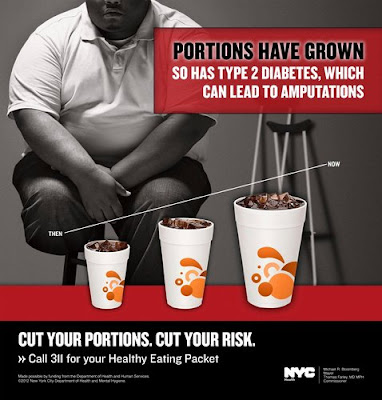
From The New York Times…
Blame Photoshop, Not Diabetes, for This Amputation
By Patrick McGeehan
New York City’s health watchdogs warn that drinking too much sugary soda could cost you a leg. But you also might lose a limb if you appear in one of their ads.
A blunt new poster from the Bloomberg administration shows an overweight man on a stool, his right leg missing below the knee. A pair of crutches leans against a wall beside him. The advertisement, being placed throughout the subway system, warns that ever-growing portions of fast food and sodas could cause diabetes, which could lead to amputations.
But it turns out that the person shown in the advertisement did not need crutches because his legs were intact. The health department confirmed on Tuesday that its advertising agency had removed the lower half of the man’s leg from the picture to make its point: the headline over the image reads “Portions have grown. So has Type 2 diabetes, which can lead to amputations.”
When city officials announced the campaign on Jan. 9, they did not let on that the man shown — whose photo came from a company that supplies stock images to advertising firms and others — was not an amputee and may not have had diabetes. The city did not identify the man, and efforts to reach the agency that supplied the photo were unsuccessful. The photographer who took the picture, Morten Smidt, said he did not know the man’s name.
Mr. Smidt said on Tuesday that he had not seen the advertisement. In response to a description of it, he said, “Well, it is an illustration now, clearly not the picture I did.”
In a news release about the campaign, the health department said that in 2006, nearly 3,000 New Yorkers with diabetes were hospitalized for amputations. The advertisements are the latest in a series of attention-grabbing messages about the dangers of smoking, drinking and consuming too many sweets and fatty foods. Other advertisements that the health department sponsored featured a grizzled smoker who talked through a voice box and a woman named “Marie” from the Bronx who showed off what appeared to be fingers whose tips had been lost to smoking.
City officials said those advertisements were testimonials that showed real people and real consequences. But they said that doing so was not always feasible. “Sometimes we use individuals who are suffering from the particular disease; other times we have to use actors,” said John Kelly, a health department spokesman. “We might stop using actors in our ads if the food industry stops using actors in theirs.”
The American Beverage Association, which opposes the city’s efforts against sodas and fast food, called the advertisement overwrought. “This is another example of the ‘What can we get away with?’ approach that shapes these taxpayer-funded ad campaigns,” Chris Gindlesperger, the association’s director of communications, said in a statement.
Bob Garfield, a commentator for Advertising Age and National Public Radio, said that the misrepresentation “was lazy or cheap or silly, but I wouldn’t lose any sleep over it.” Still, he said, “Why people lie when there’s no penalty for telling the truth is an absolute mystery to me.”


